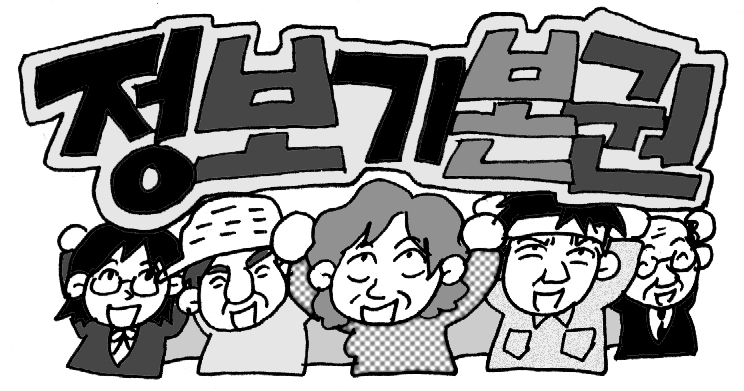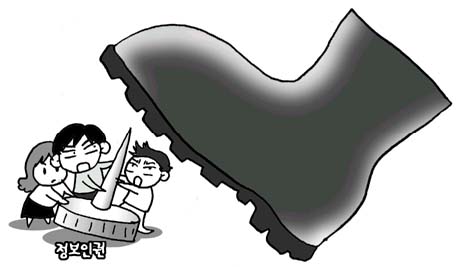Introduction

กใ
This picture means Human Rights in the Information Society
Human rights mean rights
of humans, that is to say, "Rights essential for
human beings to live a humane life."
Every Individual is born
with and entitled to the inherent and inalienable rights,
and most nations around the world have laws to
guarantee their people human rights. In particular,
fundamental freedoms and rights described in the national
constitution are called Basic Rights.
There have been numerous controversies and debates throughout
history over what human dignity is and what is needed
to uphold the human dignity. Stepping toward the modern
times people started to realize all the human beings
deserve inherent dignity regardless of their social
status determined by birth. A lot of efforts were made
to turn this concept into action, such as emancipation
and feminist movements.
The tragedy
of two world wars and Fascism made people aware of the
necessity that the value of human rights should universally
accepted and internationally protected. The United Nations
created in 1945 concluded protection of fundamental
freedoms and rights are essential to achieving world
peace, and adopted and proclaimed the Universal Declaration
of Human rights in its 1948 General Assembly. The Declaration
established a common standard for the human rights that
all peoples and all nations on the globe should accept
and share without any kind of distinction, such as political,
economic, cultural and religious differences.
It was not until 1966 that the spirit of the Universal
Declaration of Human Rights was realized in the form
of an effective international law as the UN adopted
two International Covenants on Human Rights. One
is the International Covenant on Economic, Social and
Cultural Rights(so-called Social Covenant or Covenant
A) and the other is the International Covenant on Civil
and Political Rights(so-called Civil Covenant or Covenant
B) Afterwards the UN continued to come out with additional
international standards and laws to protect the human
rights of the underprivileged including women, children,
ethnic minority and migrant workers.
As the social movements
to build up the meaning and strengthen the range of
human rights went on, these efforts bore some fruit.
Nowadays fundamental freedoms and rights set forth in
the Declaration are recognized universal human rights
in most parts of the world. Fundamental freedoms include
the right to freedom of religion, freedom of opinion
and expression, freedom of peaceful assembly and association.
And everyone is expected to has the right to a standard
of living adequate for himself/herself and their family,
right to education and social welfare, right to special
care and assistance for motherhood and childhood, right
to a decent environment and right to work in favorable
conditions. In addition, it is widely accepted nobody
shall be discriminated against their nationality, race,
gender, religion, opinion, social status, sexual orientation,
birth place, disability, age and so on.
In
the Information Society, human rights should be protected!

กใ Human Rights in the Information
Society
The government seeking
more efficient administration and the business pursuing
greater profits have tried to develop and introduce
advanced information technology to the society time
and again. But they do not seem to be concerned about
additional measures necessary to help remove unexpected
challenges coming up in transition to the Information
Society against protection of human rights. As a result,
these days we can see many cases in which free use of
information is limited and people' right to privacy
is infringed.
The Information
Society is not a separate world from what we live in
now. That is a society that we are building. "Human
Rights in the Information Society" means the human
rights described in the Universal Declaration of Human
Rights and in the related international laws should
still be protected. Not only does HRIS serve the last
safeguard to guarantee people the fundamental freedoms
and rights which seem to be easily threatened in transition
to this new form of society, the Information Society,
but it means our ongoing effort to make sure democracy
and human rights are still respected and pursued in
the middle of and even after the Information Society.
Recently freedom of expression,
he right to privacy, right to share information and
right to access information are at issue. Since they
are closely related to communication and flow of information,
these rights came under threat stemming from the state
and market driven push for the Information Society as
well as became especially important in the Information
Society.
This book is made to
help you understand the concept of Information Human
rights and protect and exercise your rights for yourself.
Our collective efforts to keep our human rights can
put the Information Society on our side. Now,
we call for your action!
November 11, 2003
Korean Progressive Network, 'Jinbonet'
(140-868) Jung-bong-won B/D 5F, 1-13, Chungpa-dong
1ga, Yongsan-gu, Seoul, South Korea
Tel. +82-2-701-7688 Fax. +82-2-701-7112
Contact: della@jinbo.net / patcha@patcha.jinbo.net
|